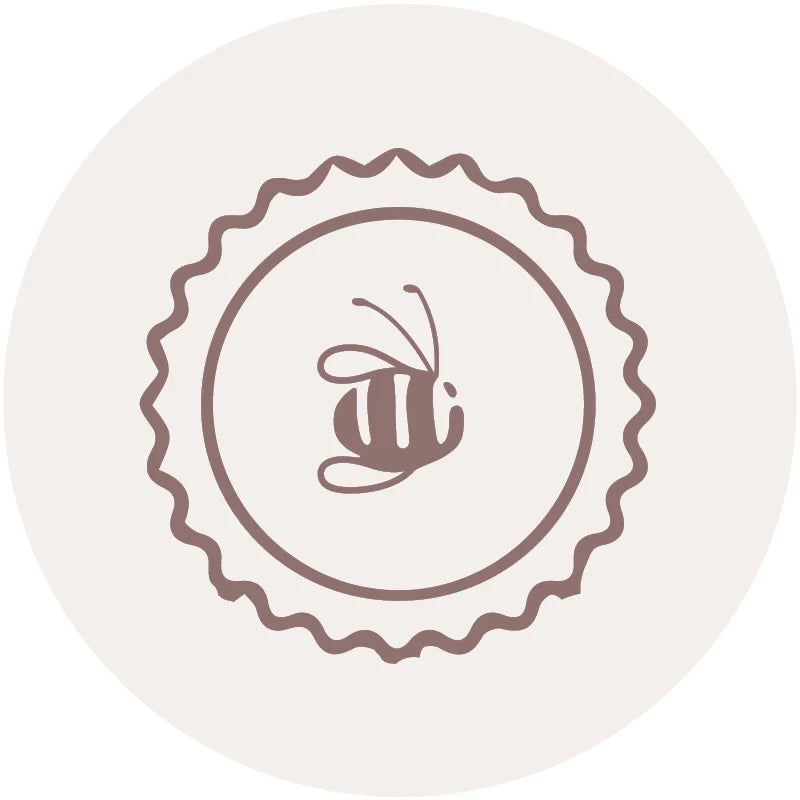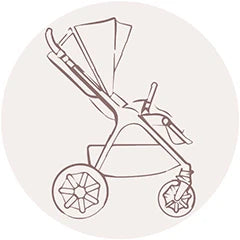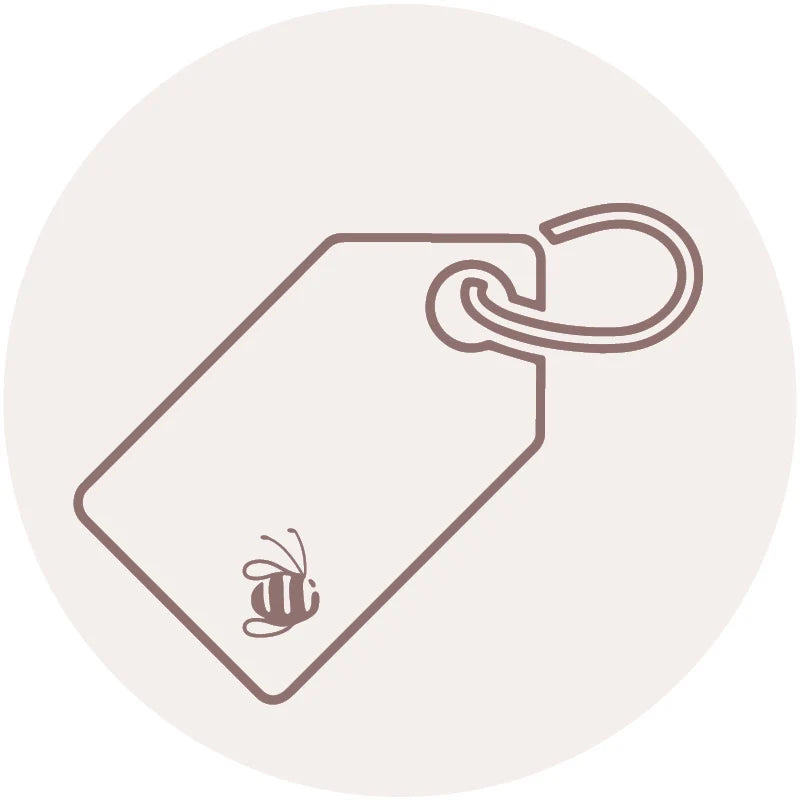Moon Milk
Moon Milk
SKU:MMBPP-MM
Clothing Prem to 18 Months
| Size | Age Guide | Weight | Height |
|---|---|---|---|
| Premature | Premature or Small Newborn | Up to 4Kg | Up to 55cm |
| Newborn | 0-3 months | 4-6Kg | Up to 62cm |
| 3 Month | 3-6 months | 6-8Kg | Up to 68cm |
| 6 Month | 6-12 Month | 8-10Kg | Up to 76cm |
| 12 Month | 12-18 Month | 10-12Kg | Up to 84cm |
| 18 Month | 18-24 Month | 12-14Kg | Up to 92cm |
Clothing 2 to 6 Years
| Size | Age Guide | Height | Chest | Waist | Hip |
|---|---|---|---|---|---|
| 2 Year | 2-3 Years | Up to 100 cm | 56 | 51 | 58 |
| 3 Year | 3-4 Years | Up to 105 cm | 58 | 53 | 60 |
| 4 Year | 4-5 Years | Up to 110 cm | 60 | 55 | 62 |
| 5 Year | 5-6 Years | Up to 115 cm | 62 | 57 | 64 |
| 6 Year | 6-7 Years | Up to 120 cm | 64 | 59 | 66 |
Beanie Size Guide
| Size | Head Circumference | Age Guide |
|---|---|---|
| Premature | 31-35 cm | Premature or Small Newborn |
| Newborn | 35-40 cm | Newborn |
| Small | 40-43 cm | 3-6 Months |
| Medium | 43-47 cm | 6-18 Months |
| Large | 47-52 cm | 18-3 Years |
Sunhat Size Guide
| Size | Head Circumference | Age Guide |
|---|---|---|
| Newborn | 37-40 cm | Newborn |
| Small | 40-43 cm | 3-6 Months |
| Medium | 43-46 cm | 6-12 Months |
| Large | 46-49 cm | 12-24 Months |
| Xtra Large | 49-54 cm | 2-4 Years |
Sleep Pods Size Guide
| Size | Weight | Age Guide | Measurement(Back to Hem) |
|---|---|---|---|
| Newborn | 0-6 kgs | 0-3 Months | 60.5 cm |
| Small | 0-8 kgs | 3-6 Months | 66 cm |
Booties Size Guide
| Size | Age Guide |
|---|---|
| Newborn | 0-3 Months |
| Small | 3-6 Months |
| Medium | 6-12 Months |
| Large | 12-18 Months |
Pretty Brave Baby
| Foot Length (mm) | Insole Length (mm) | EU | UK | Age | INT |
|---|---|---|---|---|---|
| 95-104 | 110 | 16/17 | 2 | 0-6m | S |
| 104-114 | 118 | 18 | 3 | 6-12m | M |
| 114-123 | 127 | 19/20 | 4.5 | 12-18m | L |
| 123-137 | 142 | 21/22 | 5.5 | 16-22m | XL |
Pretty Brave 1st Walker
| Foot Length (mm) | Insole Length (mm) | EU | UK | Age |
|---|---|---|---|---|
| 114-120 | 125-128 | 19 | 3 | 1 yr |
| 120-126 | 132-135 | 20 | 3.5 | 1-2 yrs |
| 126-132 | 138.5-141.5 | 21 | 4.5 | 1-2 yrs |
| 132-138 | 145-148.5 | 22 | 5 | 2 yrs |
Crywolf Swim Nappy
| Size | Length (waist to crotch) | Crotch Width (side to side) |
|---|---|---|
| 0-1 yr | 1-2 yrs | |
| 37 | 38 | |
| 14.5 | 15.5 |
Crywolf Rash Suit
| Size | Length (back neck to crotch) | Chest (arm to arm) | Waist (side to side) | Sleeve (neck to cuff) | Neck Opening(diameter) |
|---|---|---|---|---|---|
| 6-12 Months | 1 yr | 2 yrs | 3 yrs | ||
| 40 | 42 | 44 | 46 | ||
| 25 | 26 | 27 | 28 | ||
| 24 | 25 | 26 | 27 | ||
| 30 | 31.5 | 33 | 34.5 | ||
| 13.25 | 13.25 | 13.8 | 14.3 |
In stock
Couldn't load pickup availability
Overview
Overview
Motherhood does not switch off at night, and neither does your mind. Moon Milk is your new evening ritual, created to help you slow down, exhale, and ease into restful sleep during pregnancy and postpartum. Developed with Sleep Consultants and specially formulated for mums, this warm, creamy hot chocolate blend combines carefully selected adaptogenic superfoods to support relaxation when you need it most.
Each ingredient has a purpose. Premium dutched cocoa powder is naturally rich in magnesium to promote relaxation. Organic green banana provides natural tryptophan to support melatonin production and healthier sleep cycles. Chamomile and organic amla berry are traditionally known for their calming properties, helping soothe the nervous system. Organic mekabu wakame seaweed offers a natural source of iodine to support overall wellbeing, while organic maca works as an adaptogen to help the body manage stress and balance hormones.
This a gentle, nourishing night time drink designed to support you from conception through breastfeeding and beyond.
Simply enjoy a warm cup before bed and allow your body to unwind.
Key Features
Key Features
Technical Specification
Technical Specification
User Guide
User Guide
Delivery and Returns
Delivery and Returns
- Delivery: Free within NZ on orders over $100 (excluding bulky items) or $8 standard shipping
- Returns: Accepted within 14 days of receipt with proof of purchase
- Some items are excluded from returns including sale items, hardware, car seats, prams, monitors and personal items - please click here for the full list.
Share this product
Recently Viewed Products
Related Blogs
Mindful Meal Prep for Expectant Mums
In today’s busy modern society, the importance of sitting down together as a family at meal times and eating together and sharing about your day is a lost tradition for many. It is instead often a time that is busy, chaotic, and full of distractions with parents and children eating dinner at different times. There has been a plethora of research conducted around the benefits of family meal times, these benefits are said to include reduced rates of obesity, that adults tend to eat more slowly and often consume less food because they are engaged with other family members and discussion. This leads to less fast-paced mindless eating, chewing food adequately, and time for satiety ques to signal you are full more effectively. Something as simple as slowing down at meal times and chewing food effectively is an incredibly powerful health habit as this allows for the first phase of digestion to happen more efficiently. Cephalic phase digestion, meaning ‘of the head’ occurs at the sight, smell and taste of food and results in the excretion of approximately 20% of the gastric secretions required for digesting foods. Being mindful to slow meal times makes a huge difference in allowing the body adequate time for `these digestive phases to take place, chewing food is an incredibly important part of this process as it not only begins the mechanical breakdown of food but allows foods to be effectively mixed with saliva that is full of enzymes required to break down and digest foods. As a busy mum of four myself, I admit at times that when dinner rolls around at the end of a long day it feels like a chore, and can feel like a ‘job’ that I just want to be over as fast a possible. I have become aware that when I approach meal times in this way I end up feeling more stressed and don’t take the time to cook meals that are as nutritious as I would like, often resulting in me feeding the kids first which almost always leaves them not eating much of their dinner. My kids also don’t wind down as well when we approach meal times in this way and can easily flow on to a more challenging bedtime. In contrast, when we cook and eat together as a family, I usually feel less stressed, my children feel a sense of pride in having helped, and because I have put more thought into that meal time its generally a nutritionally superior meal. I almost always find the kids will eat more of their dinner and be far less fussy when meal times are approached in this way. I also notice my children are more relaxed at bedtime when we have had a relaxing family dinner together also. The research has also indicated that eating together builds stronger family relationships as it allows you all to come together and discuss your day, and feel connected and heard which helps to build a stronger sense of belonging which is thought to build self-esteem. Children learn through an example so role modeling good eating habits and table manners provides a great learning opportunity. As I always say aim for progress, and not perfection when it comes to health, if family meal times are not something that you currently do often in your house aim to implement a day a week and build on that. Don’t let it be a source of stress or guilt but instead a new fun tradition to start as a family. In my next blog, we will take a look at fun ways to get kids in the kitchen to teach them the valuable life skill of cooking. Kylie Stowe @melawholefoods Veggie loaded meatballs with salad and kumara wedges Serves 4 Meatballs 400 grams of prime minced beef 1 grated carrot 1c of thinly sliced baby spinach 2 cloves of crushed garlic 1 egg 4 tbsp of grated parmesan 2 tbsp of almond flour 1 tin of Ceres Organics Cherry Tomatoes Handful of freshly chopped thyme Kumara wedges 4 small kumara cut into chunky wedges Drizzle of olive oil Seasoning Side salad 4 cups of salad greens 1c of halves cherry tomatoes 4 tbsp of toasted pumpkin seeds 4 diced gherkins ½ a diced cucumber ½ a diced capsicum Drizzle of balsamic vinaigrette Method Preheat the oven to 180c fan bake Combine and mix through all of the ingredients for the meatballs (besides the tinned tomatoes and thyme) shape into golf ball sized meatballs. Mix the tinned tomatoes and herbs then pop in the fridge while you prepare the kumara wedges. Toss the kumara fries in oil and seasoning. Line a shallow baking dish with baking paper then evenly arrange the kumara wedges and put into the oven. Remove the meatballs from the fridge, lightly brown in a cast iron pan and top with the tomato and herb mixture. Put into the oven. Bake both for approximately 20 minutes depending on your oven. While the kumara and meatballs are baking combine the salad ingredients. I like to serve mine with a dollop of coconut yogurt. Enjoy!
Learn moreThe Power of Gratitude
The Power of Gratitude Parenting can be incredibly rewarding – but let’s be honest, it’s also really hard. Becoming a mum changes almost every part of your life: your body, your routine, your social life, even your sense of self. And while dads may not go through the physical toll of pregnancy, birth or breastfeeding, they still feel the effects of broken sleep, lifestyle changes, and the loss of independence. When you’re deep in the trenches of early parenting, being told to “count your blessings” can feel irritating at best. But frustrating as it is, there’s some truth to it. Research shows that practising gratitude can genuinely boost your mental health – and even shift the way your brain works. The power of positive language You can’t just switch on feelings of gratitude like a light. Emotions don’t work that way. But you can start building habits that encourage a more grateful mindset. A study from the University of Indiana found that writing about things you feel thankful for – even small ones – can help rewire your thinking over time. Focusing on positive words and thoughts, whether through journaling or writing gratitude letters, helps nudge the brain away from negativity and towards contentment. If you’ve got time, jotting down a few lines in a journal can be helpful. But even if you’re juggling a million things, you can still give it a go – a scribbled post-it, a chalkboard note, or adding to a family gratitude jar are all simple ways to start. Some parents even use social media as their own mini gratitude log. Whatever method works for you, the key is to do it regularly. Over time, it really can make a difference. Gratitude takes practice People who practise gratitude tend to cope better with stress, feel more optimistic, and have greater self-esteem. That said, it’s probably not the gratitude alone that makes life feel easier – it’s the long-term shift in how they view the world. Gratitude isn’t a magic fix. The change happens slowly, as your brain gets used to noticing and appreciating the good. By practising now, even in small ways, you may find you’re better able to enjoy the everyday moments later on. That said, if you’re feeling low for an extended period, or struggling with sadness or anxiety, it’s important to reach out. A gratitude journal is lovely, but it’s not a substitute for professional help. Talk to your midwife or GP – they’re there to support you. Give it a try Gratitude doesn’t have to be another thing on your already long to-do list. And there’ll definitely be days where you won’t feel remotely thankful for the mountain of laundry or a toddler’s meltdown. But on the days you can, take a moment – maybe when they’re finally asleep – to notice what you do feel grateful for. It might just make the ride a little smoother.
Learn moreNo matter the colour, all our clothes are green on the inside
Dimples has always been a proud New Zealand brand, with strong Kiwi values. Protecting the environment is one of them. Even as we’ve grown from a home business to a larger company, that commitment hasn’t changed. The clothing industry is notoriously hard on the environment – and on the people involved. It can cause incredible environmental and social damage worldwide: from cotton farms that suck up huge amounts of valuable water, to clothing factories using harsh chemicals and exploiting their workers; from the use of fossil fuels for shipping, to ‘fast fashion’ that ends up in landfills after a few wears. We work hard to minimise our impact on the environment by keeping our production in New Zealand, using local materials as much as possible, and avoiding the factory system altogether. It’s about protecting our world long term – and making adorable, high quality baby gear at the same time. Made here, sold here Dimples clothing is produced right here in New Zealand. This lets us avoid shipping product across the world using harmful fossil fuels – it’s one of the most important ways that we reduce our environmental impact. Making our clothes in New Zealand also means that we can control the quality of our product, and the working conditions of our sewers. We know that all our clothing is produced to an extremely high standard, by workers who are paid well and treated fairly. That’s incredibly valuable. Starting from scratch Where clothing is assembled isn’t the only factor when it comes to the environment. Sourcing the raw materials – merino wool and cotton , in our case – is also important. Our merino comes from a mix of New Zealand and Australian sheep, which means the raw materials don’t have to travel very far, and we can keep an eye on the quality. New Zealand’s climate isn’t suitable for large-scale cotton production, so we import only pure, organic-certified cotton to make sure the impact of cotton farming is minimal. Small scale production Dimples started out as a home-based business, and although we’ve grown, we haven’t changed all that much. We don’t have a huge factory producing our clothing – instead, our expert sewers work from their homes. It’s essentially a scaled-up version of the small home workshop where it all started. The classic Dimples bee and rose are still hand-stitched onto every garment. This system doesn’t just result in a better quality product, it also helps us avoid the environmental costs of factory production – we don’t use huge amounts of power to run machinery, or process our materials using harsh chemicals. Made to last The end result of our high-quality materials and high production values is hard-wearing, long-lasting clothing. Our customers find that our clothing lasts through wash after wash without fading, stretching or pilling. Many customers use our clothing for multiple children, then pass it on to friends or family. This is environmentally friendly in itself – the more your child or children can wear each garment, the less you’ll need to throw away. This reduces the need for production and reduces the amount of landfill. It’s all part of our ongoing commitment to our beautiful world. We’re not green because it’s trendy or expected, we’re green because we care – and we always will. Take a look at our NZ made clothing now
Learn moreMotherhood: Beyond the Fourth Trimester
Beyond The Fourth Trimester - A Sustainable Approach To Health Once the first few months with your new baby have passed you might be feeling like the haze of those early weeks has passed. You also might not be there just yet, just as each baby is different so is each pregnancy and the subsequent postpartum period. This is why it is important to be mindful of not judging how well you are doing based on other mothers who might appear to be completely back to normal with a baby who sleeps all night. If you are still breastfeeding, many mothers report a drop in milk supply at this point often saying that they no longer feel like their breasts are as full. This is something I experienced with my first baby and thought it meant I was losing my milk supply. It is normal for the initial fullness and engorgement to diminish as your milk supply is more established at this point, and your body has adjusted to supplying what your baby needs. If you do ever feel concerned by this your Plunket nurse, local lactation consultant or the La Leche league are a wonderful source of support & encouragement. Once those exhausting early months have passed many of the mothers I work with are keen to start focusing on reclaiming their pre-pregnancy bodies and to start dieting and exercising. Focusing on good nutrition and consistent exercise is hugely beneficial and has many positive health impacts such as increased energy, better sleep, improved mood and changes in body composition. What is really important to be mindful of, is that changes in diet and physical activity are best to be done with an incremental approach to minimise the chances of under-fuelling yourself, drops in milk supply, injuries and adding too much pressure on yourself. It also allows you to build sustainable health habits that you are more likely to maintain long term. I always recommend an appointment with a postpartum trained physiotherapist. They can assess your posture for diastasis recti (tummy muscle separation) and guidance on pelvic floor exercises. Women who have had caesareans often think because they haven't had a natural birth they don't need to worry about pelvic floor exercises - this isn't the case, pregnancy still takes its toll on the body so re-strengthening the pelvic floor after carrying a baby is important for all mothers. Working with a personal trainer that specialises in postpartum exercise is a great idea. They can ensure your exercise technique is correct to avoid injury and set an exercise program that is suitable for your current fitness level that will be mindful of the changes that need to be made to a fitness program based on your requirements postpartum. When looking at dieting I always encourage my Mum’s take a non-diet approach to focus on improving health not through restriction but with healthy nutritional choices that improve their health status not diminish it. To achieve this we focus on a nutritional approach that has a strong focus on nutrient repletion to help the body to replete nutrients that were preferentially supplied to their growing baby. Focusing on a diet full of whole unprocessed foods is the foundation for this. Most women find that this approach is very empowering, it leads to better satiety and self-regulation of eating over restriction then binge eating. When it comes to improving your diet always aim for progress, not perfection, and most importantly enjoy your meals! Adequate protein intake is essential for tissue repair and rebuilding especially when exercising. Sources of protein include meat, chicken, seafood, eggs, legumes nuts and seeds. Protein also helps to keep you feeling full for longer. I use and recommend Clean Lean Protein powder for smoothies as it is perfectly safe for breastfeeding mums. You can use the discount code ‘mela’ to save 15% at nuzest.co.nz . Eating plenty of colourful vegetables and some fruits (eat the rainbow!) is important to supply essential vitamins, minerals, phytonutrients, fibre and carbohydrate. I aim to have three fist-sized servings of vegetables with lunch and dinner. It is important to supply yourself with some complex carbohydrate for energy and to assist with glycogen repletion after exercising. Some good sources are pumpkin, yams, kumara, and whole grains such as brown rice and quinoa. Don't forget to incorporate healthy fats with each meal. Fats have been demonised and avoided for so long that many people are not aware of how important adequate fat intake is for health. Dietary fat is essential for the absorption of many nutrients, production of certain hormones, the supply of energy and support of cell growth. Good sources of healthy fats include oily fish such as salmon, extra virgin olive oil, hemp seed oil, avocado, nuts and seeds. Lastly don't forget to drink your water! Aim for two glasses on rising then another 2 litres throughout the day and more when exercising. If you are a breastfeeding mum aiming to have a glass of water with each feed I find keeping a water bottle close by during the day and for those night feeds is a great idea - it’s thirsty work! Kylie Stowe @melawholefoods Postpartum Nourish Bowl Serves 1 Ingredients 120-150 grams of cooked sliced meat (or vegetarian alternative) 2 cups of salad greens 1 cup of an assortment of diced colourful vegetables 1 palm-sized serve of cooked complex carbohydrate (pumpkin, yams, brown rice, quinoa, kumara) ¼ - ½ of an avocado or 40 grams of Feta 1 tbsp of hummus 1tbsp toasted pumpkin & sunflower seeds 2 tbsp of dressing of your choice. Method Arrange all of the ingredients in a bowl, season, drizzle with dressing and enjoy! My favourite dressing is made with extra virgin olive oil, apple cider vinegar & wholegrain mustard. To change up the flavours you can coat your protein in different herbs and spices the one pictured is Moroccan chicken.
Learn more












